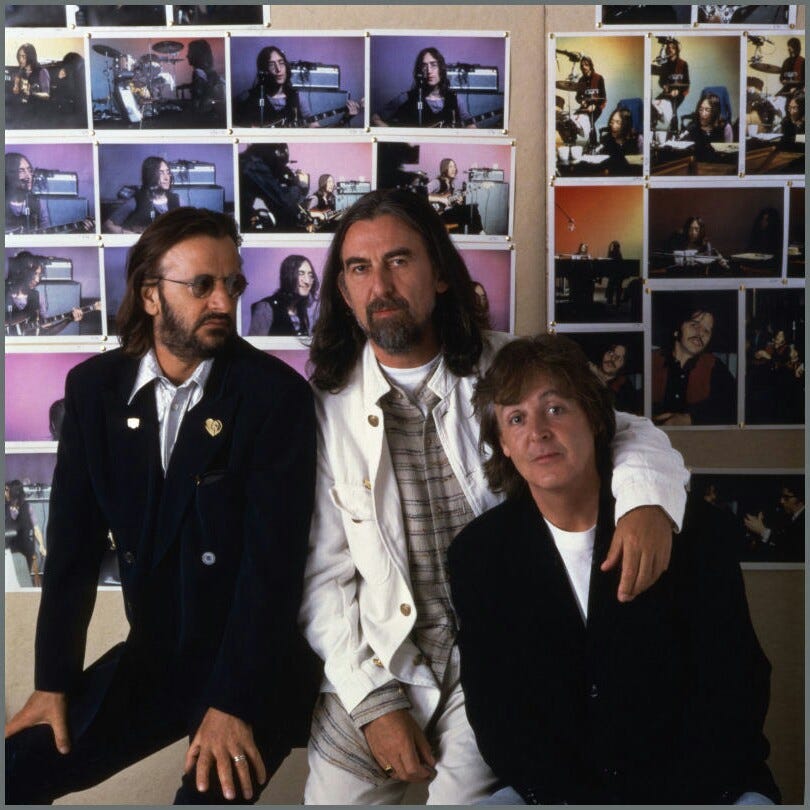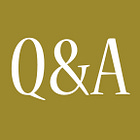Hi everyone,
As always, I continue to be behind in answering your questions (including an important question about “However Absurd” that I have not forgotten about). So this week, let’s see if I can knock off a few of the easier questions in a single go, including the most frequent question—
How long till Part Two is ready?
Awhile. There is much research still to be done, and I’ve only just started to find the rough outline of an approach for Part Two, in terms of how to re-tell the story of The Beatles through the frame of the lovers possibiilty within our established ethical guidelines.
Bonus answer: Part Two will probably start with the fête and conclude with either the “All You Need Is Love” broadcast, Brian’s death or their arrival in India in February 1968. (Those of you who know to read the footnotes already know this, of course.)
I’m curious what’s on your playlist, besides the Fabs?
Right this exact second? Lots and lots of AMM, since writing the Beatles & The Avant Garde Micro-Rabbit Hole. Also Nick Cave’s “Idiot Prayer,” Billy Joel (because of And So It Goes, of course), the Grateful Dead and West Coast ‘60s acid rock (for research), and the latest release from Engelbert Humperdinck. 😉
Also, my EDM Paul McCartney playlist (with a little bit of John) is always in the mix and is more or less the soundtrack to the writing of Beautiful Possibility—
And speaking of Anthology—
Why now, of all times, do you think they're releasing the fourth album? It seems a little arbitrary when the others were released over a decade ago; can the advancements in remastering tech really be that significant?
I’m obviously not privvy to the thinking behind the expanded re-release of Anthology, but yes, I absolutely do think the remix (not just remastering) technology is significant enough to justify it, especially relative to “Free As A Bird” and “Real Love.”
The remix of “Free As A Bird” was presumably accomplished with the same technology that cleaned up the audio tracks for “Get Back” and the other album remixes. And the 2025 version of “Free As A Bird” is night-and-day in terms of the quality of John’s voice.
Hearing John as he sits alone at the piano in the Dakota singing his love for Paul and for The Beatles in a voice so tentative, so vulnerable, so newly present — and hearing Paul and George sing their love back — is a poignant and necessary part of healing this story.
Given all of that, it’s hard to see how Apple releases remixes of “Free As A Bird” and “Real Love” in any meaningful way without tying them to a larger project — and the obvious project to tie them to is, of course, their original home, Anthology.
It’s not clear to me if we’re also going to get cleaned-up Forthlin Road recordings, remixes of the Royal Variety Performance, the Decca audition tracks, “My Bonnie” and “In Spite Of All The Danger/That’ll Be The Day,” but I hope so. Those tracks are also important, and likely to come to life in a new way with a pass through the marvelous “Get Back” audio restoration machine.
And there are good reasons beyond cleaning up the audio tracks for re-releasing a sparkling new version of Anthology.
The original release is several decades old as a retrospective, and it hasn’t aged well — especially in light of “Get Back” and everything else that’s been re-released shiny and new in the past few years.
The documentary especially is only available on DVD and poor-quality online bootlegs — which means a lot of people don’t even know it exists. WIthout easy access on streaming platforms — along with a promotional campaign to let new fans know to go looking for it — new audiences won’t engage with Anthology in any large numbers. And there’s a lot to engage with there — even if much of it is fictional, it’s still much better and healthier fiction than the distorted “John vs Paul” biographies from Norman et al.
It also, I think, goes without saying that never-before-seen footage of Paul, George and Ringo together is precious, even beyond the opportunity for more lovers possibility research. ;-)
Speaking of new movies—
What do you think about the four Beatles movies?
I don’t think anything about the Beatles movies, because I try very hard not to think about them at all.
With Paul and Ringo involved, I do have hopes that we at least won’t have to deal with the distorted “John/more vs. Paul/less” breakup narrative — like “Anthology,” it will at least be a better/healthier fiction, and that’s not nothing. But speaking as a former working Holllywood script doctor whose creative partner is still a working Hollywood script doctor, there are way too many ways for Hollywood to get it wrong and do damage in other ways.
I expect to be disappointed — and since happiness = reality divided by expectations, by expecting disappointment, there’s the outside chance I’ll end up being pleasantly surprised.
I really like listening to your voice.
Yes, yes. Here:
Are you going back to Liverpool anytime soon?
Yes, in November, mostly for inspiration rather than research. But prior to that, I’ll be in Chicago for a week of research in Northwestern University’s rare Beatles collection.
Will you ever return to posting on The Red Abbess?
Only if I have something to say that can’t be said here. Turns out I’m less passionate about talking about passion than I am about living my life as an expression of it.
Do you think “Eleanor Rigby” is a metaphor for Paul and John’s relationship?
Obviously this isn’t a “lightning round”-type question. “Eleanor Rigby” is one of the great masterpieces of English literature, and exploring it in any meaningful way without question requires a full, formal Abbey piece. Ergo, the complexities of Eleanor’s metaphorical identity will have to wait till Part Two.
Meanwhile, the short answer is — yes, probably, and especially if my still-in-progress research is correct about what seems to have been happening between John and Paul in 1965/early 66. We’ll talk about that more in the (hopefully) upcoming Abbey piece on “Got To Get You Into My Life,” and of course, in Part Two of Beautiful Possibility.
(And to the person who asked this, thank you for the lovely email. I will respond as soon as I can, but please know it might be a little while.)
Given everything that’s wrong with the world, is writing about John and Paul as lovers the best use of your considerable talent?
Beautiful Possibility seeks to heal the wound at the heart of the foundational mythological story of our modern world, and to remedy the injustice done to the two men who gifted us with that story. There’s no better way to use my talent than to be part of that healing. (And thank you — I think? — for the compliment. ❤️)
What if you’re wrong about John and Paul being lovers?
Well, first, Beautiful Possibility isn’t seeking to prove that John and Paul were lovers. Absent the kind of proof that I do not have and would not share if I did, there’s no way we could prove (or disprove) what went on in private between two people, even if we had the ethical standing to do so. Beautiful Possibility seeks only to show that the possibility is credible, that it’s an important question, and that there is an ethical, respectful way of including it in the story. Hopefully, Part One did those three things.
That said, obviously I wouldn’t be investing the time and resources in researching and writing Beautiful Possibility if I didn’t think it was highly likely that Paul and John were a romantic couple. If it turns out I’m in some way provably wrong about that — and I’m not quite sure how that would be accomplished — then I’ll have been a fool for love, and there’s nothing I’d rather be a fool for.
I’ll leave you this week with an observation from Dr. Carol Symes, Harvard-educated professor of history and theater at the University of Illinois — “I think it’s unethical for a group of scholars to be confronted with perfectly plausible questions and some plausible evidence and to refuse to consider it. I’m hard-pressed to think of another realm of scholarly discussion in which real, interesting scholarship is being done by people outside the academy.” 1
Waving hello from The Abbey, Dr. Symes.
Until next week.
Peace, love, and strawberry fields,
Faith ❤️
PS I need a better Q&A thumbnail, if anyone wants to come up with one. No AI, please.
quoted in Shakespeare Was A Woman And Other Heresies, Elizabeth Winkler, Simon & Schuster, 2023.




